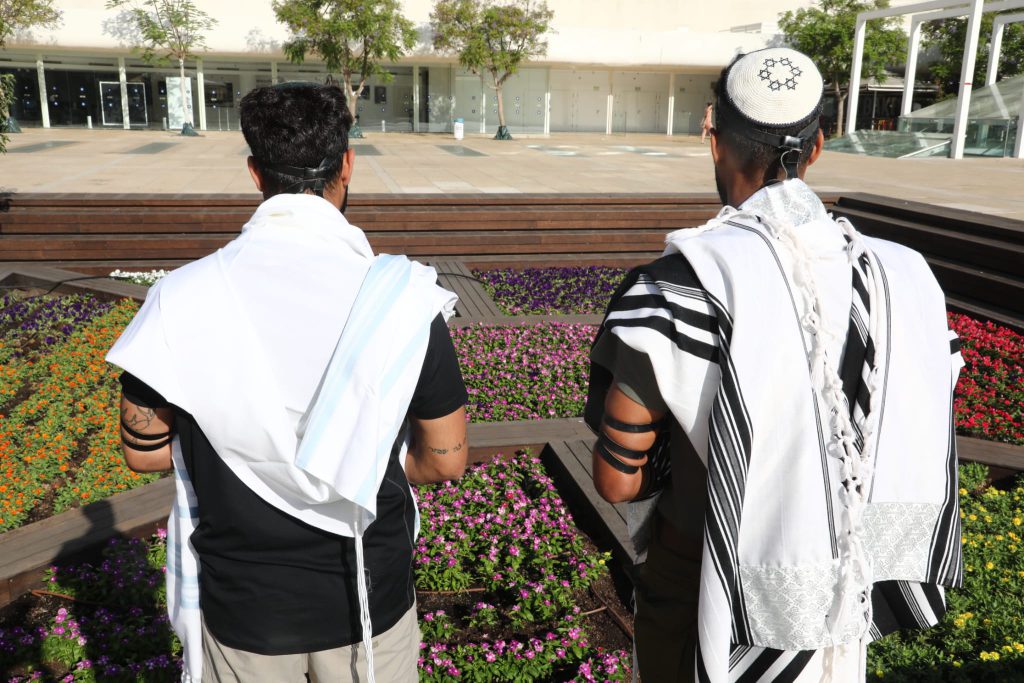Increasingly, Israelis are forgoing the religious-secular binary. Instead, many are locating themselves along a continuum.
The fact that a religious song, written by Rabbi Shalom Arush and Yosef Elitzur, became the number one hit on Galgalatz – the radio station most closely associated with secular Israeli culture – was not just another musical footnote. It was a dramatic cultural and social phenomenon. A moment like this, when a wholly secular mainstream embraces lyrics steeped in faith and longing for closeness to God, signals something profound: the growing “traditionalization” of Israeli society.
This middle ground – between Orthodox observance and secularism – has become the central terrain of identity in Israel. Increasingly, Israelis are forgoing the religious-secular binary. Instead, many are locating themselves along a continuum, adopting symbols, customs, and language rooted in Jewish tradition, while not defining themselves as observant. One can see this in the secular soldiers in Gaza who wrap tefillin before heading into battle, the high school students who insist on wearing tzitzit but not kippot, and the crowds who flock to slihot (penitential prayers), though they rarely set foot in synagogues.
Even everyday secular Israeli life has a more traditional hue: lighting Shabbat candles, fasting on Yom Kippur, or eschewing leavened products during Passover – not as acts of religious repentance but as expressions of a conscious choice to embrace tradition. Among younger Israelis, the trend is even more striking. A glance at TikTok reveals tens of thousands of “secular” youth enthusiastically adopting fully religious practices.
Official figures from Israel’s Central Bureau of Statistics show that nearly 43% of Israeli Jews identify as secular, while just under 34% identify as traditional. However, deeper surveys reveal that within the “secular” group, many regularly observe religious practices and express some form of belief in God. Only a relatively small group – roughly 18% – can truly be described as “pure” secularists.
The recent selection “Hashem Ohev Oti” (“God Loves Me”) as Galgalatz’s song of the year is emblematic of this broader trajectory. Once a shrine of secular Israeli culture, the mainstream is now signaling that tradition has lost its stigma. On the contrary, it is becoming woven into a new Israeli collective identity, one that seeks common ground in the space between the sacred and the profane. This is not an entirely new phenomenon, but the fact that such a song can top the secular chart underscores its cultural currency.
Ideological secularism – the ethos once carried proudly by Israel’s founding generation – is fading. The younger generation feels less committed to it and increasingly regards it as alienated or disconnected from their roots. In its place, a new “traditional” Israeli identity is emerging: one that draws inspiration from both rabbis and Galgalatz, from the synagogue and the nightclub.
It must be stressed: This is not a “return to religion.” Most Israelis adopting religious symbols are not enrolling in yeshivas or covering their heads. It is an identity shift, a search for belonging, a desire to anchor the self in tradition without abandoning the secular world. In a reality marked by internal divisions, war, and constant tension, tradition offers solid ground – a cultural anchor that fuses Jewishness with Israeli secularism and melds them into a replenished Israeli identity.
For many liberals, this development seems like a step away from universalist values and toward religious cultural dominance. For others, it is a welcome return to Jewish identity that strengthens national unity. In practice, this new traditionalism may offer an identity capacious enough to contain both liberal secularism and Jewish religiousness.
Perhaps it even signals a reconciliation between values long cast as discordant. If that proves true, Israeli society may find itself standing on much-needed common ground.

